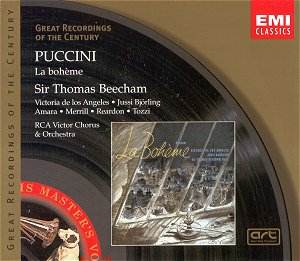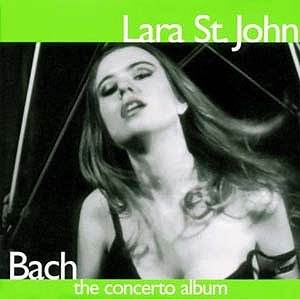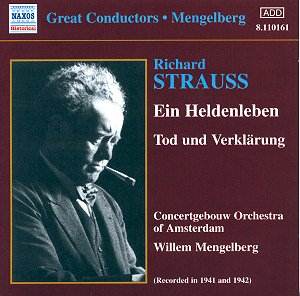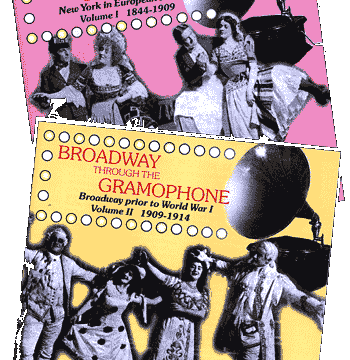 Composer: Giacomo Puccini
Composer: Giacomo Puccini
Works: La Bohème
Performers: Rodolfo – Jussi Björling (tenor), Mimi – Victoria de los Angeles (soprano), Musetta – Lucine Amara (soprano), Marcello – Robert Merrill (baritone), Schaunard – John Reardon (baritone), Colline – Giorgio Tozzi (bass), Parpignol – William Nahr (tenor), Benoit/Alcindoro – Fernando Corena (baritone), Un doganiere – Thomas Powell (baritone), Sergente – George del Monte (baritone), Columbus Boys Choir, RCA Victor Chorus and Orchestra, Sir Thomas Beecham (conductor)
Recording: Recorded at Manhattan Center, New York in March/April 1956 mono
Label: EMI
Puccini’s La Bohème emerges as one of the quintessential operatic masterpieces, encapsulating the bittersweet essence of youthful love interspersed with the harsh realities of life. Composed between 1893 and 1895, it is a definitive work within the verismo movement, yet it transcends mere realism to evoke deep emotional resonance through Puccini’s masterful manipulation of melody and orchestration. Sir Thomas Beecham’s 1956 recording, featuring an extraordinary cast and the RCA Victor Orchestra, serves not merely as a document of performance but as a vibrant interpretive experience that reveals the intricacies of Puccini’s score.
From the outset, the recording captures a palpable energy, reflecting Beecham’s expertise in Puccini’s oeuvre—an expertise born from over three hundred performances of the work. The orchestra’s opening measures are infused with a radiant clarity, a hallmark of Beecham’s conducting style. Notably, his approach to the orchestral prelude sets a tone that balances lyricism with dramatic urgency, creating an immediate connection to the emotional landscape of the narrative. The recording also benefits from the clarity of the mono sound, which, despite its limitations, allows for a directness that enhances the listener’s immersion into the bohemian world of Paris.
Jussi Björling’s portrayal of Rodolfo is a highlight, delivering a nuanced characterization that oscillates between youthful exuberance and poignant despair. His opening aria “Che gelida manina” is rendered with a lyrical warmth that encapsulates both the character’s romantic idealism and underlying vulnerability. Björling’s use of dynamic shading and expressive phrasing is particularly noteworthy; he imbues the line with an ardor that is both thrilling and deeply affecting. Victoria de los Angeles, as Mimì, complements this with her own radiant timbre and heartfelt delivery. Her first entrance, marked by the delicate “Mi chiamano Mimì,” is imbued with a fragile beauty that resonates throughout the performance, particularly in her offstage “Scusi,” which evokes a visceral emotional response.
The orchestral interludes between the arias are equally compelling, especially in Act II where Beecham’s orchestration reveals layers of orchestral color. The brass section delivers a fiery beginning to the act, but the chorus’s initial sound lacks the spirited vivacity expected in a bustling café scene. However, as the act progresses, the ensemble’s cohesion improves markedly, particularly during Musetta’s entrance. Lucine Amara’s portrayal of Musetta is spirited and assertive, her famous “Quando m’en vo'” showcasing not just her vocal prowess but also her character’s vibrant personality. Here, Beecham’s careful attention to orchestral dynamics allows the orchestration to breathe and interact with the singers, creating a vivid tableau that captures the essence of bohemian life.
The third act is a poignant turning point, characterized by the stark contrast of the winter setting and the emotional unraveling of the central characters. The orchestral palette reflects the somber mood; Beecham’s adept handling of the strings and woodwinds evokes the chilling atmosphere of despair. The poignant interaction between Björling and Merrill in this act crystallizes the tension; Merrill’s Marcello is portrayed with impassioned sincerity, creating an emotional depth that complements Björling’s Rodolfo. As the quartet unfolds, the interplay between the voices is masterfully executed, highlighting Puccini’s genius in intertwining personal tragedy with collective emotion.
The final act, marked by its heart-wrenching simplicity, showcases the recording’s emotional heft. The death scene is rendered with a delicate touch, devoid of melodrama yet profoundly moving. Björling’s and de los Angeles’s final exchanges are imbued with a raw authenticity that underscores the tragedy of lost love, leading to a conclusion that is both beautiful and heartrending. The technical engineering of the recording captures the nuances of this final act; the clarity of the voices against the subtle orchestral backdrop allows for an intimate listening experience that draws the audience into the emotional core of the narrative.
This recording of La Bohème stands as a monumental achievement in the opera recording canon. The synergy between Beecham’s conducting and the stellar cast yields a compelling interpretation that balances the lyricism of Puccini’s score with the emotional depth of the characters. While comparisons with subsequent recordings, such as the celebrated Decca set with Tebaldi, may arise, Beecham’s commitment to the emotional authenticity of the work alongside the exceptional vocal performances offers a unique listening experience that remains unmatched. The artistry displayed in this 1956 recording reaffirms its place as a seminal interpretation of La Bohème, capturing the essence of youthful aspiration and the poignancy of love’s fleeting nature.



